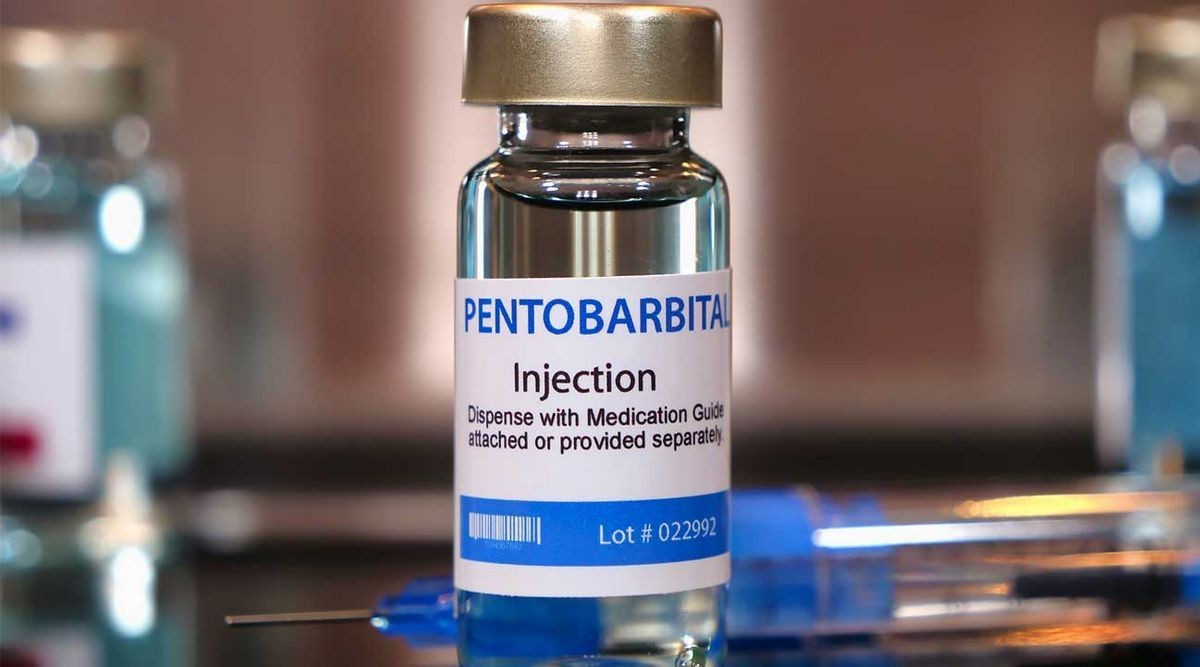
Contents
pentobarbital
Pentobarbital belongs to a class of medications known as barbiturates which depress the central nervous system (CNS). It is used off-label to induce coma and control intracranial pressure in patients with severe brain injury.
Pentobarbital enhances the activity of gamma-aminobutyric acid (GABA), the major inhibitory neurotransmitter in the brain. It binds to GABA-A receptors on nerve cells (neurons) and inhibits the activity of glutamate, the primary stimulatory neurotransmitter in the brain.
At low doses, pentobarbital produces sedation, drowsiness, and hypnosis. At higher doses, it is anticonvulsive, depresses respiration, and reduces intracranial pressure by decreasing blood flow to the brain and slowing down brain metabolism. Uses of pentobarbital include:
- Sedative for short-term treatment of insomnia or pre-anesthesia prior to surgery
- Emergency control of seizure episodes including: status epilepticus, meningitis, cholera, tetanus, eclampsia, toxic reactions to strychnine or local anesthetics
- Barbiturate coma to control elevated intracranial pressure in severe brain injury
Warnings
- Do not use pentobarbital in patients with hypersensitivity to barbiturates or any of the components in pentobarbital.
- Do not use pentobarbital in patients with severe respiratory disease, porphyria, impaired kidney or liver function, depression or suicidal tendencies, or history of drug abuse.
Side Effects of Pentobarbital
Common side effects include:
- Slow heart rate (bradycardia)
- Low blood pressure (hypotension)
- Fainting (syncope)
- Nausea, vomiting, constipation
- Pause in breathing (apnea), slow and shallow breathing (hypoventilation), respiratory depression
- Injection site reaction, fever
- Low red blood cell count with abnormally large red cells (megaloblastic anemia), liver toxicity (hepatotoxicity)
- Skin rash, skin peeling with inflammation (exfoliative dermatitis)
- Hypersensitivity reaction, swelling under the skin and mucous membrane (angioedema)
- Excessive movements and muscle spasms (hyperkinesia), voice box spasm (laryngospasm)
- Headache, dizziness, drowsiness
- Hallucination, insomnia, nightmares
- Impaired coordination, balance and speech (ataxia)
- Central nervous system stimulation, abnormality in thinking, agitation, anxiety, confusion, depression, nervousness, psychiatric disturbance
Call your doctor immediately if you experience any of the following symptoms or serious side effects while using this drug:
- Serious heart symptoms, severe headache, confusion, slurred speech, severe weakness, vomiting, loss of coordination, feeling unsteady
- Serious nervous system reaction with very stiff muscles, high fever, sweating, confusion, fast or uneven heartbeats, tremors, feeling like you might pass out
- Serious eye symptoms including blurred vision, tunnel vision, eye pain or swelling, seeing halos around lights
Report any side effects or health problems to the FDA at 1-800-FDA-1088.
Dosages of Pentobarbital
Injectable Solution: Schedule II
Adult:
Hypnotic:
- Initial: 100 mg intravenous (IV) or 150-200 mg intramuscular (IM)
- May give small increments of the drug after at least 1 minute to reach full effect
- Not to exceed 500 mg
Barbiturate Coma:
- Load: 10-15 mg/kg IV over 30 minutes; followed by 5 mg/kg IV every 1 hour for 3 doses
- Maintenance: 1 mg/kg/hour IV; may increase to 2-4 mg/kg/hour
Dosing Modifications:
Other Indications and Uses:
- Acute convulsive episodes
Geriatric:
- Not recommended; use a lower dose if necessary
Pediatric:
Hypnotic:
- 2-6 mg/kg IM once; not to exceed 100 mg
Pre-procedure Sedation:
- 2-6 mg/kg IM or 1-3 mg/kg IV; not to exceed 100 mg IM
Addiction/Overdose
- Pentobarbital is an addictive substance that has been historically misused and abused illegally. Abuse can lead to tolerance, dependence, overdose, and withdrawal symptoms upon discontinuation.
- Pentobarbital overdose can result in airway compromise, cardiovascular collapse, coma, and death.
- There is no antidote for pentobarbital overdose. Treatment is symptomatic and supportive, which may include intubation, respiratory support, blood pressure maintenance, and temperature regulation.
Drug Interactions
Inform your doctor of all medications you are currently taking to check for possible interactions.
- Severe interactions include cariprazine, cobimetinib, dienogest/estradiol valerate, doravirine, elbasvir/grazoprevir, elvitegravir/cobicistat/emtricitabine/tenofovir DF, fostemsavir, isavuconazonium sulfate, lonafarnib, lorlatinib, lumacaftor/ivacaftor, lumefantrine, lurasidone, mavacamten, naloxegol, ombitasvir/paritaprevir/ritonavir & dasabuvir (DSC), panobinostat, praziquantel, regorafenib, and roflumilast.
Always consult with your doctor or healthcare provider before making any changes to your medication regimen.
Pregnancy and Breastfeeding
- Avoid use of pentobarbital in pregnant women except in life-threatening emergencies as it can cause fetal harm and withdrawal symptoms in newborns.
- Pentobarbital use during labor can decrease uterine contractions and cause respiratory depression in the newborn.
Caution is advised in nursing mothers
Additional Information
- Pentobarbital injection is a Schedule II controlled substance and should only be used in clinical settings under the guidance of healthcare professionals. Diversion and misuse are illegal.
- Pentobarbital can cause drowsiness and impair mental and physical abilities. Avoid activities that require alertness.
- Abuse of pentobarbital can lead to dependence, addiction, and overdose. Seek medical help immediately in case of overdose.
Sources:
Brain & Nervous Resources
- 11 Tips for Avoiding Seizure Triggers
- Focal Onset Seizures in Children
- How to Make Your Home Seizure-Safe
Featured Centers
- What Are the Best PsA Treatments for You?
- Understanding Biologics
- 10 Things People With Depression Wish You Knew
Pentobarbital is a sedative/hypnotic medication used for sedation (pre-anesthesia) before surgery, for a short term to treat insomnia, and for emergency control of certain types of seizures. Common side effects include slow heart rate, low blood pressure, fainting, nausea, vomiting, constipation, pause in breathing, slow and shallow breathing, respiratory depression, injection site reaction, fever, low red blood cell count with abnormally large red cells, liver toxicity, and others.


